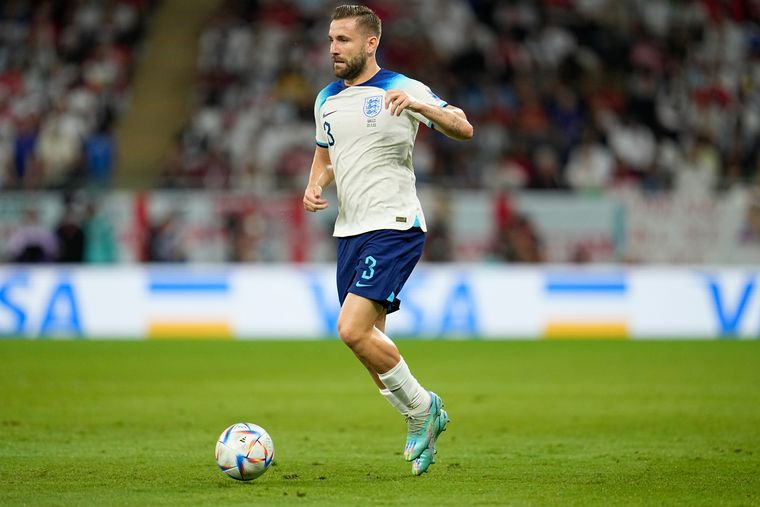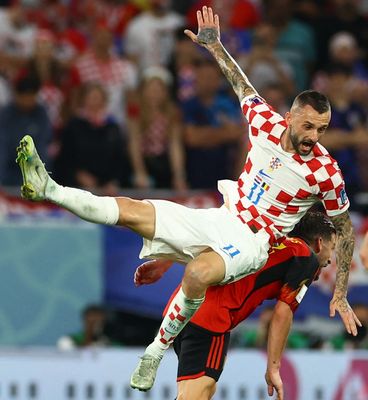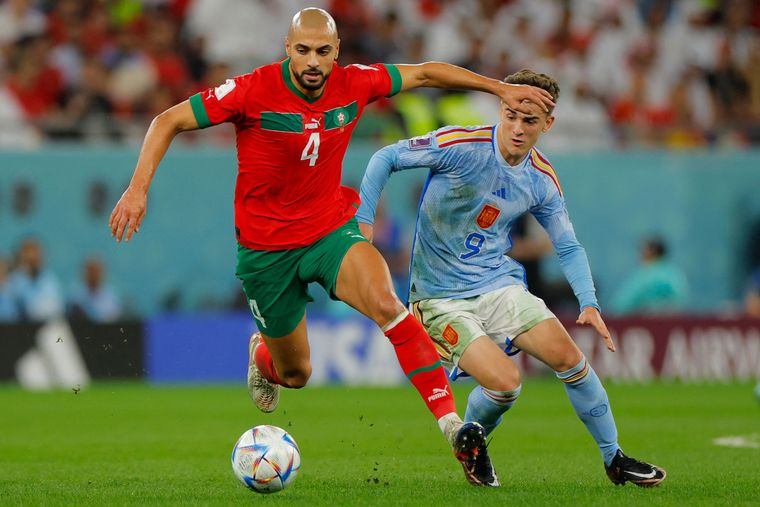Three-Lungs Park is a lucid nickname. It is clear what the player who earned such a moniker―Park Ji-sung―would be all about. Speed, energy, stamina and hard work. Italian legend Andrea Pirlo said Park, who man-marked him more than once, was one player he could not get the better of.
Wayne Rooney, who played with Park for Manchester United, said the South Korean midfielder was as important to the club's success as Cristiano Ronaldo. In his column in The Sunday Times, Rooney wrote that players like Park were overlooked because they consistently sacrificed themselves for the team.
But, Park, 41, is now widely admired for his selfless feats of grit and discipline for the great United side of the late 2000s. In that regard, Park was lucky, because there are many workhorses who never got the recognition they deserved. This World Cup, too, has seen its share of such unsung heroes.
Rodrigo De Paul
THE ARGENTINE did receive due credit after the team's Copa America triumph in 2021. But, he had a bad World Cup debut against Saudi Arabia. He has recovered since then and was at his best against Australia in the round of 16―his pressing forced the error from the goalkeeper that led to his team's second goal. But, the headlines, deservedly, belonged to Lionel Messi.
The central midfielder's contribution to Argentina's progress in Qatar has not got the attention it merits. He was the only Argentine midfielder to play every minute of the team's campaign in the first four matches. This is because he is key in allowing Messi to conserve his energy for when Argentina need their talisman most. He runs more so that Messi can walk. “The analysis that I do [during matches] leads me to try to make him run less,” he told The Athletic ahead of the World Cup, adding this was to reduce Messi's “wear and tear” and to give him more space to play with.
The numbers make this abundantly clear. He ran 44.08km, including the round of 16, more than any other Argentina player. De Paul also had the most sprints in the team (230). He led the count for offering himself to receive a pass (436) and for the number of defensive pressures on opponents (119). And, he had the most passes (384) and the most completed line-breaking passes (86).
De Paul, 28, was handed his Argentina debut in 2018 by Lionel Scaloni. He has since developed into the engine of Scaloni's midfield. It was primarily his performances for Argentina that raised his profile and earned him a transfer to Atletico Madrid in 2021. Prior to that, he spent five seasons at Italian club Udinese, captaining the team for his last six months there. De Paul is a graduate of the Buenos Aires-based Racing Club.
Luke Shaw
WHEN A LEFT-BACK is called “Shawberto Carlos”, it seems odd to suggest that he is an unsung hero (though the nickname is widely seen as a joke). However, Luke Shaw’s performances for England in Qatar have gone largely unnoticed. This is primarily because the sensational, 19-year-old central midfielder Jude Bellingham has hogged the headlines. Defensive midfielder Declan Rice, too, has caught the eye often. Shaw, meanwhile, has been working away in the background to create England’s scoring chances, on top of his defensive duties.
When Bellingham scored England’s opening goal of the tournament against Iran with a brilliant header, it was Shaw who picked him out with a precise cross. The game’s second goal came after Shaw found Harry Maguire from a corner-kick; Maguire nodded the ball down for Bukayo Saka to smash in. In the 0-0 draw against the US, Shaw created England’s three best chances to score. In the 41st minute, after a one-two with Raheem Sterling, Shaw dribbled the ball through an American defender’s legs before setting up Saka, who blasted over. Five minutes later, he played a line-breaking pass that led to a shot on target by Mason Mount and in the 93rd minute, an accurate free-kick by Shaw was headed wide by Harry Kane.
Overall, the defender had the most crosses (15) for England, including the round of 16; an impressive feat in a team with wingers like Sterling, Saka and Phil Foden. Crucially, Shaw who had a good relationship with Sterling has also linked up well with Foden since the latter took over Sterling’s starting berth in England’s last two matches. He played a key pass to Foden in the build up to England’s first goal against Senegal in the round of 16. Shaw also averages around 10km a match and provides defensive stability to England’s left flank; he is the team’s only left-footed defender.
The football world first took note of Shaw, now 27, in 2014, when he became the most expensive teenager in world football. Manchester United bought him from his boyhood club Southampton for around £30 million. Shaw, who is still at United, has done well to return to high-level football after a twin leg fracture in 2015; he had to be given oxygen on the pitch and required the attention of nine paramedics before he was stretchered off. Rehabilitation included four surgeries, learning to walk after six months on crutches and counselling to regain the courage to play.
Marcelo Brozovic
WHEN CROATIA beat England 2-1 in the semifinals of the 2018 World Cup, winger Ivan Perišic´ was chosen as the man of the match. He had scored once and assisted the late winning goal. But, away from the England goal, holding the fort in Croatia’s midfield was Marcelo Brozovic´. The defensive midfielder ran 16.34km in that match. It was a new World Cup record―the Croatian blew past the old record, which was just under 15km. Four years on, the now 30-year-old Brozovic´ bettered his record by running 16.64km in Croatia’s 1-1 draw against Japan in the round of 16 (if he had run north in a straight line, he would have reached Doha from Al Wakrah, where the match took place). He then calmly walked up to hit a penalty down the middle as Croatia eliminated Japan in a shootout. Croatian goalkeeper Dominik Livakovic´ saved three penalties and was the hero of the night. But, Brozovic´ had been key in Croatia’s game management after Perišic´ drew Croatia level.
In Qatar, Brozovic´ has been Croatia’s most important player during the transition from defence to attack. In the first four matches, he had the most passes (363) and had offered himself to receive a pass the most times (409). He had also, unsurprisingly, run the most―56.26km. “Epic Brozo”, as he is known, was the only player in Croatia’s midfield or attack to play every minute. This, too, is unsurprising, as Croatia does not really have a replacement for him, yet. Moreover, Brozovic´ is a versatile player who can slot into other midfield roles when required.
Born in Zagreb, Brozovic´ dropped out of school because his father―a butcher―said that football and school do not go together. He graduated from Hrvatski Dragovoljac, a club based in the Novi Zagreb (New Zagreb) neighbourhood. He has been contracted to Italian giants Inter Milan since 2015.
Sofyan Amrabat
THE MOROCCAN defensive midfielder revealed after the round of 16 that he and the team physio were up until 3am on the morning of the match, trying to resolve a fitness concern. “An injection before the game, too,” he said. “It was a question whether I could play this game. [But,] I can’t abandon the guys and my country.” From the way he played, it would have been impossible to guess he had any fitness issues.
Amrabat played the full two hours against Spain, running 14.67km. This included 55 sprints with a top speed of 31.9km/h. He was also, arguably, Morocco’s best presser in the match. This doggedness allowed him to outperform his defenders in terms of tackles, winning the ball with 80 per cent of his attempts. Bayern Munich defender Noussair Mazraoui was second-best with a 50 per cent success rate. Amrabat also made three crucial blocks.
He was the team’s most important player out of possession, making 99 forward runs without the ball. Paris Saint-Germain’s Achraf Hakimi, who is among the world’s best attacking wing-backs, was second with 80 runs. Amrabat also played a few key line-breaking passes and stood out for his ball-carrying ability. This meant that even as the goalkeeper’s heroics in the shootout was being celebrated, Amrabat, too, got overdue recognition.
But, his performance against Spain was not a one-off. In the first four matches at the World Cup, Amrabat played every minute and he has been the pillar supporting the team’s tactical setup, which conceded only once, that, too, an own-goal. This is made possible by the fact that there seems to be no glaring weaknesses in his game. He gets around the pitch well (his 48.10km in Qatar is the most for Morocco), can pick a pass and is neat and tidy in possession of the ball.
Born in the Netherlands to parents of Moroccan descent, Amrabat was eligible to play for the Dutch and did turn out for the team at youth level before choosing to represent the African team. His football education began with HSV De Zuidvogels, a lower-tier club, but he was later accepted at the youth academy of top-tier Utrecht; he made his senior debut for the club in 2014. Now 26, he stars for Fiorentina in Italy and is said to be wanted by English giants Liverpool.





